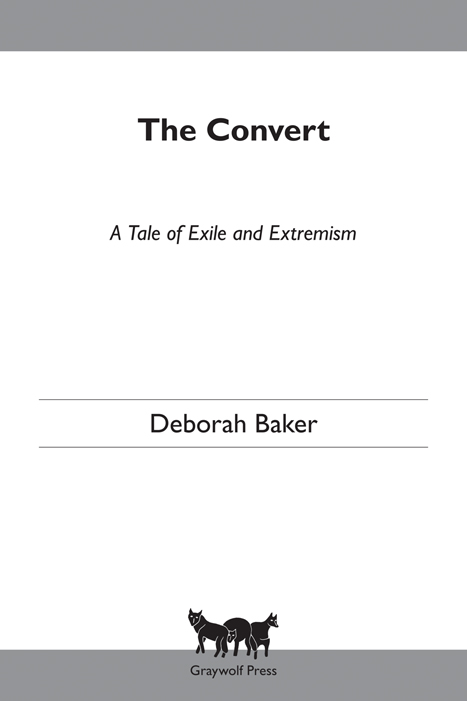
The Convert
A Tale of Exile and Extremism
کتاب های مرتبط
- اطلاعات
- نقد و بررسی
- دیدگاه کاربران
نقد و بررسی

Starred review from February 21, 2011
Pulitzer finalist Baker (A Blue Hand) unravels the often contradictory life of an American woman who became one of the pre-eminent voices of Islamic revivalism, in this stellar biography that doubles as a mediation on the fraught relationship between America and the Muslim world. Margaret Marcus was a secular Jew in Mamaroneck, N.Y., before she became fascinated with Islam and moved to Pakistan in 1962 and took the name Maryam Jameelah. Baker, who discovered the archive of Marcus's papers in the New York Public Library, carefully reconstructs her movements after her arrival in Lahore, Pakistan, using letters Marcus sent to her parents and articles she published in various Islamic magazines. Jameelah's criticism of the West is unwavering: she denounces American foreign policy, particularly its support of Israel, and secularism in general, insisting that law be derived from the Qur'an. As Baker digs deeper into her subject's difficult life—Jameelah's time in Pakistan grew increasingly strained—she ponders the effect Jameelah's writings on global jihad may have on today's al-Qaeda and Taliban. This is a cogent, thought-provoking look at a radical life and its rippling consequences.

Starred review from April 1, 2011
A Pulitzer Prize finalist delves into the fascinating life and letters of a young Jewish woman who converted to radical Islam and moved from suburban New York to Pakistan.
In 1962, 28-year-old Margaret Marcus left her parents' secular Jewish home to live in Lahore in the Muslim household of idealogue and Islamic political leader Maulana Mawdudi. In Pakistan, Marcus changed her name to Maryam Jameelah and penned expressive letters to her parents describing, during the next three decades, her newfound identity, community and the motivations behind her conversion and all-consuming embrace of Islam. Jameelah went on to write not only letters—the archives of which Baker (A Blue Hand: The Beats in India, 2008, etc.) came across in the New York Public Library—but an enormously popular set of books criticizing Western materialism and exalting life lived according to the laws of the Koran. Baker's account unfolds chronologically through Jameelah's letters, included in the book, as well as various articles she published in American magazines. Despite Jameelah's unwavering, outspoken disdain for Western secularism, she faced mounting obstacles in her new life, all of which the author examines as a platform to explore the broader subject of how radical idealism manifests itself. Jameelah eschewed what she viewed as the miserably misguided popular values of her native country, but this opposition did not tamp out her love for and connection to her parents. On this note, Baker, who corresponded and finally met with Jameelah in her home, opens the door to the vital questions of how radical Islam has impacted the world, and what part converts such as Jameelah have played.
An important, searing, highly readable and timely narrative.
(COPYRIGHT (2011) KIRKUS REVIEWS/NIELSEN BUSINESS MEDIA, INC. ALL RIGHTS RESERVED.)

Starred review from April 15, 2011
In 1962, Margaret Marcus (b. 1934), a young Jewish woman from New York's suburbs, converted to Islam, left America, and moved to Pakistan to live as a disciple of one of the major architects of the Islamist revival, Mawlana Abul Ala Mawdudi (1903-79). As Maryam Jameelah, she excoriated American decadence and warned of the dangers of Western influence, laying a cornerstone of Islamic fundamentalist ideology. Biographer Baker (In Extremis: The Life of Laura Riding) came across an archive of Jameelah's papers and became entranced; she presents here a spellbinding factual account of Jameelah's estrangement from her family, faith, and country; her quest to find an authentic Islam halfway around the world; and her confinement in mental asylums on two continents. How did this troubled woman become the theorist behind the notion of Islam vs. the West? Baker's investigation of Jameelah yields mysteries and surprises galore. VERDICT A significant contemporary figure in Islamic-Western relations becomes human, with all the foibles and angst that word implies. General readers will find this story compelling, while scholars will be pleased with the insight it brings to an important 20th-century Islamist voice. Highly recommended.--Steve Young, McHenry Cty. Coll., Crystal Lake, IL
Copyright 2011 Library Journal, LLC Used with permission.

April 1, 2011
Bakers fascinating biography attempts to recount the life of Margaret Marcus. Born in New York and raised as a Jew, Marcus eventually converted to Islam, moved to Pakistan in the early 1960s, changed her name to Maryam Jameelah, and became one of the most prolific Muslim revivalist ideologues. Her scathing critique of modernism and her denunciation of the West have not only provided an intellectual foundation for but also have been an inspiration to many present-day revivalists. This is no introduction to Jameelahs thought. By reconstructing the events of the journey from Margaret to Maryam, Baker hopes to understand how an American-born woman could come to reject the West, choose a life of relative isolation and obscurity in Pakistan, and adopt what many would regard as an extreme religious position. Although this biography can be read, as the subtitle states, as a tale of exile and extremism, it might also be read as the sad story of a woman simultaneously struggling with severe mental illness and seeking meaning in a confusing world.(Reprinted with permission of Booklist, copyright 2011, American Library Association.)

























دیدگاه کاربران